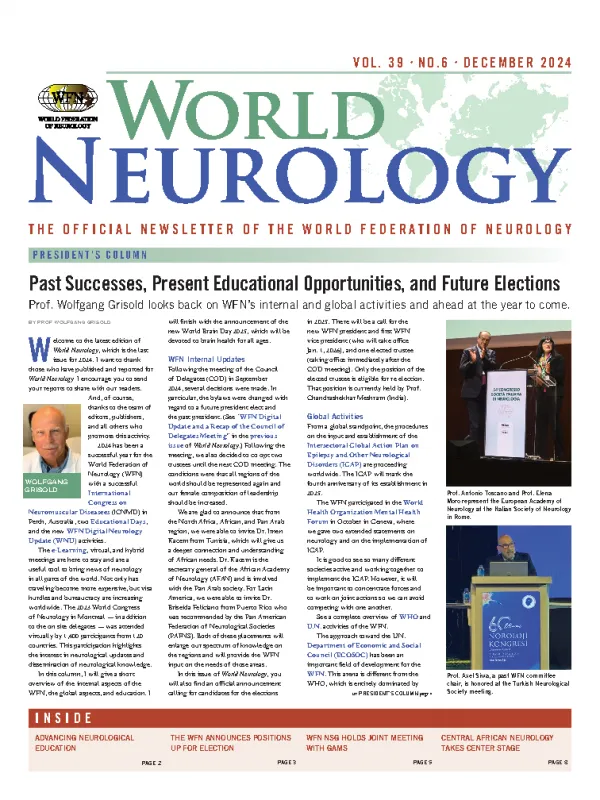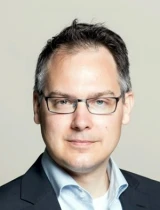
We would like to welcome you to the December 2024 issue of World Neurology, the final issue of this calendar year. In the President's Column, WFN President Prof. Wolfgang Grisold provides updates on several ongoing WFN activities, including operational and global developments, education, and the introduction of the new World Brain Day 2025 theme.
Also, this issue includes an important call for nominations for the three WFN positions that will be elected in 2025.
This issue includes several reports of recent national and regional meetings, including a report by Dr. Daniel Gams Massi on the hybrid Presidential Symposium of the Fourth Congress of the Cameroon Academy of Neurology, a report by Profs. Marina Alpaidze, George Chakhava, and Alex Razumovsky on the joint meeting of the WFN Neurosonology Specialty Group and the Georgian Association of Medical Specialties, and a report by Prof. Bruno Giometto on the inauguration of the first clinical neuroscience course at the University of Trento in Italy.
In the History column, Dr. Peter Koehler explores the life of the other Babinski: Ali-bab, the author of a French cookbook, and its interface with the history of neurology. This issue also includes an opinion piece from Prof. Raad Shakir regarding the current clinical status of anti-amyloid therapy, specifically lecanemab, for Alzheimer's disease. Readers should note that opinions in World Neurology represent those of the author(s) and are not necessarily the opinions of the WFN, its trustees, or its member societies.
We also have two obituaries for prominent neurologists who we recently lost. Dr. Natalia Acosta-Baena and Dr. Ricardo Nitrini provide their heartfelt tribute to the life and legacy of Prof. Francisco Javier Lopera Restrepo, a prominent Alzheimer's disease researcher from Latin America. Dr. Duygu Selcen and Dr. P. James B. Dyck provide their remembrance of Prof. Andrew Engel, a legend in the field of neuromuscular disease.
In closing, thank you to all neurologists and neurologic trainee readers in all regions of the world for your interest in the WFN and World Neurology over this past year. We look forward to continuing to share more details about the upcoming activities for neurologists worldwide in future issues and invite your contributions to the email addresses listed in the masthead on the left. •


By Steven L. Lewis, MD, Editor, and Walter Struhal, MD, Co-Editor
Published by Ascend Integrated Media LLC, Kansas, USA
Highlights
President's Column
-
Past Successes, Present Educational Opportunities, and Future Elections ⧉
By Wolfgang GrisoldWelcome to the latest edition of World Neurology, which is the last issue for 2024. I want to thank those who have published and reported for World Neurology. I encourage you to send your reports to share with our readers. And, of course, thanks to the team of editors, publishers, and all others who promote this activity.
From WFN
- The WFN Announces Positions up for Election by the Council of Delegates in 2025 ⧉
By Wolfgang Grisold, WFN president, and Laura Druce, WFN CEOThe World Federation of Neurology (WFN) encourages all member societies to suggest suitable candidates for the positions of WFN president, first vice president, and elected trustee. Engagement for the WFN and neurology in a global context are expected. Availability, readiness for communication, and experience with international and global societies are required. English is the communication language of the WFN.
- WFN NSG Holds Joint Meeting With GAMS⧉
By Marina Alpaidze, MD, PHD, George Chakhava, MD PHD, and Alex Razumovsky, PHD, FAHA, NVSThe Neurosonology Specialty Group (NSG) of the World Federation of Neurology (WFN) is dedicated to the promotion of science and research as well as education and training in the field of ultrasonic techniques and its clinical utilization. International cooperation and the dissemination of scientific information within the field of neurosonology is part of the group's regular activities.
In Memoriam
- Dr. Francisco Javier Lopera Restrepo (1951-2024) ⧉
By Natalia Acosta-Baena, and Ricardo NitriniFrancisco Javier Lopera Restrepo passed away on Sept. 10, 2024, a great loss for his family, friends, collaborators, for all of science, and for neurosciences in Latin America. He leaves the advances brought by his studies as well as a great legacy that includes important developments and a large number of highquality disciples. Dr. Lopera was born.
Dr. Andrew Engel (1930-2024) ⧉
By Duygu Selcen, MD and P. James B.Dyck, MDDr. Andrew Engel, one of the legends in the field of neuromuscular disease, passed away on Oct. 20, 2024.
Around the World
- Advancing Neurological Education ⧉
By Prof. Bruno GiomettoIn a milestone for neurological education, the University of Trento in Italy marked the launch of its inaugural clinical neuroscience course within the framework of its five-year-old master's degree in medicine and surgery. The course inauguration was highlighted by the presence of Prof. Wolfgang Grisold, president of the World Federation of Neurology (WFN), who delivered a master class on the global perspectives of teaching neurology.
- Central African Neurology Takes Center Stage ⧉
By Daniel Gams Massiuring its fourth congress from Oct. 18-20, 2024, in Douala, the Cameroon Academy of Neurology (CAN) organized its second hybrid Presidential Symposium. This session was enhanced by the participation of Profs. Wolfgang Grisold, president of the World Federation of Neurology (WFN), Prof. Lawrence Tucker, president of the African Academy of Neurology (AFAN), Prof. Amadou Gallo Diop, immediate pastdirector of the WFN Training Center of Dakar, Senegal, and Prof. Riadh Gouider, past trustee of the WFN and head of the neurology department of Razi University Hospital in Tunis. The symposium was chaired by Dr. Daniel Gams Massi, CAN secretary-general and AFAN treasurer.
- Rethinking High-Risk Strategies in Stroke Prevention ⧉|
By Aida KondybayevaStroke and Cardiovascular Disease Prevention: Time to Action!" was the theme of a World Stroke Day event, which was held on Nov. 5, 2024, at the Central City Clinical Hospital in Almaty, Kazakhstan. Organized by Asfendiyarov Kazakh National Medical University and the Central City Clinical Hospital of Almaty, the meeting brought together health care professionals to discuss new approaches in stroke prevention.
History
- Gastronomy by Ali-bab, the Other Babinski ⧉
By Peter J. KoehlerThe story begins in 1848, a year in which several revolutions took place in Europe, including in Poland. Fleeing this revolution, a Polish couple moved to Paris the following year, where two sons — Henri and Joseph — were born in 1855 and 1857, respectively. Henri attended the École des Mines, after which he worked in South America for about 20 years. After their parents' deaths in the late 1890s, he returned to Paris and shared an apartment with his younger brother.1 Meanwhile, Joseph studied medicine and served internships in various Parisian clinics during the 1880s. From November 1885 to October 1887, he was chef-de-clinique at the Salpêtrière under Jean-Martin Charcot (1825-1893), whose bicentennial will be celebrated in July 2025 in Paris..
Opinion
-
Lecanemab for Alzheimer's: Not Just Yet ⧉
By Raad Shakir, CBE FRCPThe whole world continues to wait for neuroscientists to come up with an effective treatment for Alzheimer's disease. The condition attracts huge public interest, and there is intense focus on treatment availability. The "accumulation of soluble and insoluble aggregated amyloid-beta (Aβ) may initiate or potentiate pathological processes in Alzheimer's disease. Lecanemab, a humanized IgG1 monoclonal antibody that binds with high affinity to Aβ soluble protofibrils, was tested in persons with early Alzheimer's disease.







